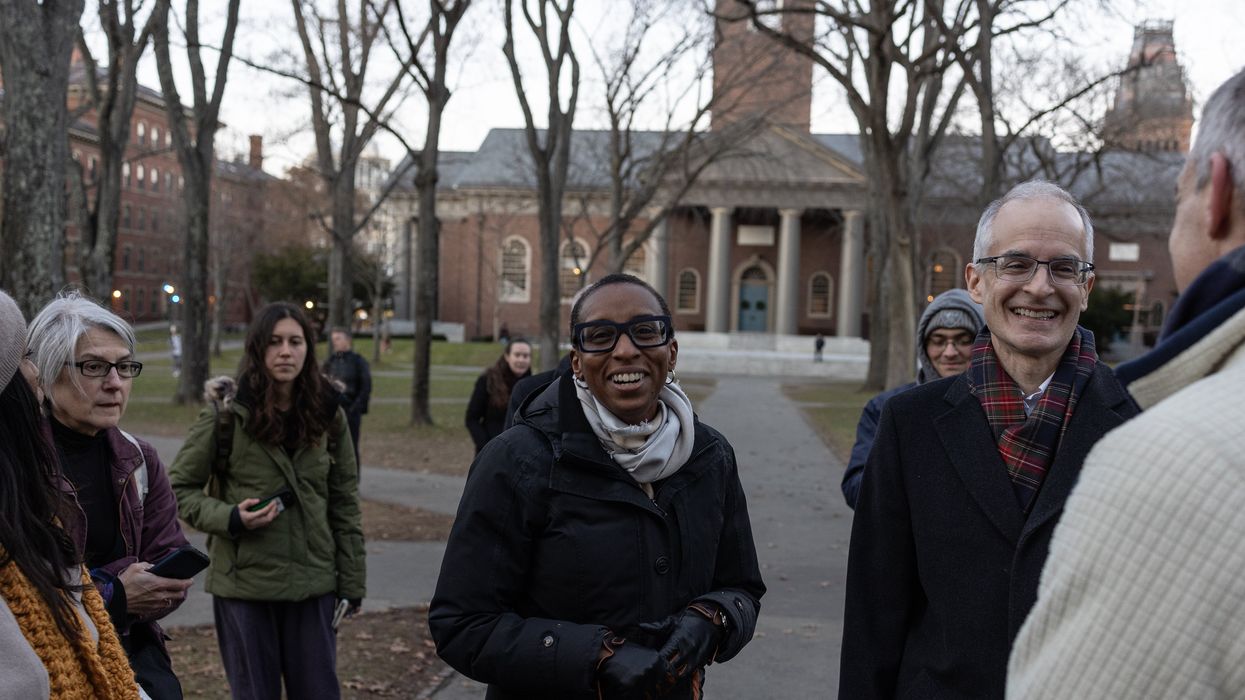Rikleen is the executive director of Lawyers Defending American Democracy and the editor of “ Her Honor – Stories of Challenge and Triumph from Women Judges.” For 10 years, she served as a trustee at Clark University in Worcester, Massachusetts.
The resignations of two Ivy League presidents – Claudine Gay of Harvard and Elizabeth Magill of the University of Pennsylvania – demonstrate the peril facing university leaders who lean into old models that no longer work. Free speech as a revered tenet of higher education cannot demand silence in this all-hands-on-deck moment in history. Universities today have a duty to address increased manifestations of bias, growing threats to democracy and the erosion of individual rights.
Our country is under siege from behaviors and public rhetoric that would have been unfathomable a decade ago. Excessive vitriol and political lies have desensitized the nation, allowing the flourishing of a pernicious campaign to gaslight organizations into silence. In the resulting quiet, mimicry has become the sincerest form of flattery.
Too often, campuses hide behind concepts of free speech and academic freedom to condone their own silence and avoid entering the fray of modern discourse. Universities seeking to respond with a moral compass fear being dismissed as “woke,” and administrators that speak out face the wrath of political leaders and their supporters who are willing to take down every opponent who disagrees.
But the country today desperately needs the moral clarity that an institution of higher education can offer. Studied silence cannot work in these troubled times.
Universities have risen to the occasion previously, so we know they can shift in times of need. Consider the unifying moment when campus leadership rightly stood up to condemn the cold-blooded murder of George Floyd at the hands of a Minneapolis police officer, abetted by his colleagues. Universities around the country immediately condemned the systemic racial injustice and police brutality that led to Floyd’s death, and committed to change their culture and focus on ways to alleviate racism.
For example, at Furman University in South Carolina, the school conducted a racial equity audit, promised to increase Black student enrollment and Black faculty hires, and instituted a zero-tolerance policy in response to racism and discrimination. Brown University called on its campus community to “act against racism and police brutality,” and matched that call with resources, research, programs and projects to address systemic racism. Student groups, including sororities and fraternities, also expressed a commitment to anti-racist and inclusive behaviors.
In the years since, however, higher ed’s focus on anti-racist policies and practices to address the impact of historic systemic racism have faded in intensity. Instead, educators at all levels face hostility and backlash against DEI initiatives, a whitewashing of American history and attacks on a teaching methodology called “critical race theory” that became a derogatory pseudonym for any conversation about race in a classroom.
Governors and legislators have brought this fight directly to colleges and universities, using the budgeting process as a cudgel. In one of the more extreme examples, Florida Gov. Ron DeSantis successfully undertook a hostile takeover of New College, a top-ranked liberal arts college, turning a bastion of inclusion and civility into an unrecognizable campus that abolished DEI efforts, eliminated its gender studies program, fired faculty and replaced administrative leaders. Students and professors have fled the school for other colleges and its ranking has plummeted.
The Oct. 7, 2023, terrorist attack perpetrated by Hamas, an organization devoted to the elimination of Israel, was so brutal in its execution that it should have elicited clear condemnation from university leaders throughout the country. Instead, as some student groups defended Hamas and antisemitic incidents increased, universities grappled with how they should publicly respond to the terrorism and kidnappings, as well as how to keep their campuses secure.
This was soon followed by a show-trial congressional hearing in which three female presidents of the nation’s top universities provided overly legalistic responses to the trap set by the House Education and the Workforce Committee. The presidents gave tortured responses to simplistic questions, walking directly into the minefield that exploded with their efforts to address their concomitant obligations to protect free expression.
But freedom of expression should not prevent a university from speaking with unequivocal clarity in matters of moral imperative. An institution should be capable of speaking as a governing and leadership body, while promoting and protecting the free expression of ideas among students and faculty.
Indeed, the highest calling of higher education should be the ability to both model courageous behavior and encourage civil discourse in ways that can serve as conflict-resolution lessons throughout life.
Universities are essential to a thriving democracy. They have the privilege of teaching lessons to generations of students that will guide them throughout their lives. With that privilege comes the obligation to confront their moral obligation to speak in times of crisis, and then infuse their campuses with opportunities for civil dialogue to address the passions and perspectives that will emerge.
In these difficult times, with so much at risk, there is no such thing as principled silence. There is, however, the opportunity for academic institutions to demonstrate leadership and learning lessons that can have far-reaching implications beyond what takes place in the classroom.




















